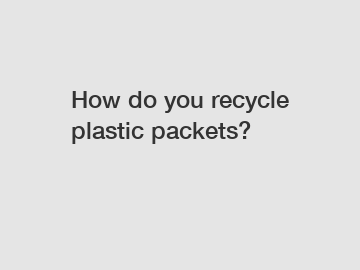Nov. 25, 2023
Packaging & Printing
How do you recycle plastic packets?
Plastic waste has become a significant environmental concern in recent years, with billions of plastic packets being discarded worldwide each day. Consequently, the need for effective recycling strategies to address this issue has been increasing rapidly. In this article, we will explore various methods and initiatives that can help us recycle plastic packets efficiently.
1. Understand the types of plastic packets:

Before delving into recycling methods, it's essential to know the different types of plastic packets. Most plastic bags fall under the category of low-density polyethylene (LDPE), which includes grocery bags, dry cleaning bags, and bread bags. High-density polyethylene (HDPE) bags, such as those used for packaging milk and bread, are also common. Additionally, there are various other types of plastic packets like polypropylene (PP) and polyethylene terephthalate (PET), which are used for products like chip packets and soda bottles, respectively.
2. Check your local recycling guidelines:
Recycling practices vary across different regions, so it's crucial to consult your local recycling guidelines to ascertain which types of plastic packets can be recycled. In some areas, plastic bags might be eligible for curbside recycling, while in others, specialized drop-off points or separate recycling facilities exist. Familiarize yourself with these guidelines to ensure your recycling effort is effective.
3. Opt for reuse:
One effective way to reduce plastic waste is to reuse plastic packets. Instead of throwing them away after one use, consider repurposing them for various tasks like storing items, packing lunches, or organizing belongings. By reusing bags multiple times, we can extend their lifespan and minimize the amount of plastic waste generated.
4. Explore recycling programs:
Suggested reading:Many retailers and supermarkets have established plastic bag recycling programs within their stores. These initiatives encourage customers to return used plastic bags for proper recycling. Such programs typically have designated collection points where customers can drop off their used bags. By participating in these programs, we can ensure that plastic packets are getting recycled and diverted from landfills.
5. Engage in soft plastic recycling:
Soft plastics refer to flexible packaging items like plastic food wrappers, plastic film, and bubble wraps. While these items may not be accepted in regular recycling streams, several specialized soft plastic recycling programs exist. These programs collect soft plastics for recycling into new products, such as park benches and bottle caps. Find out if soft plastic recycling options are available in your area and participate in these initiatives.
6. Promote responsible plastic disposal:
Proper disposal of plastic packets is crucial, as even small amounts of plastic ending up in the environment can have detrimental effects. Make sure to dispose of plastic packets in designated bins or recycling points to prevent them from polluting water bodies or natural habitats. Moreover, educating others about the importance of responsible plastic disposal can create a collective effort to combat plastic pollution.
7. Support legislation and campaigns:
Advocating for policies that promote plastic recycling and reduce single-use plastics is another effective strategy. Stay informed about legislations related to plastic waste management in your area and support campaigns that aim to raise awareness about the importance of recycling plastic packets. By demanding sustainable practices from companies and governments, we can contribute to a greener future.
In conclusion, recycling plastic packets is crucial to mitigate the environmental impact of plastic waste. By understanding the types of plastic packets, studying local recycling guidelines, opting for reuse, exploring recycling programs and soft plastic recycling initiatives, promoting responsible disposal, and supporting legislation and campaigns, we can collectively make a significant difference. Let us all do our part in recycling plastic packets and being responsible stewards of our environment.
For more information, please visit coffee and tea packaging solutions, Custom Retort Pouches, custom flat bottom pouches.
Further reading:Previous: Which futuristic applications can transform pharmaceutical glass tubes?
Next: Which Aluminum Foil Battery Packaging is the most cost-effective choice for B2B purchase?
Related Articles
If you are interested in sending in a Guest Blogger Submission,welcome to write for us!
All Comments ( 0 )